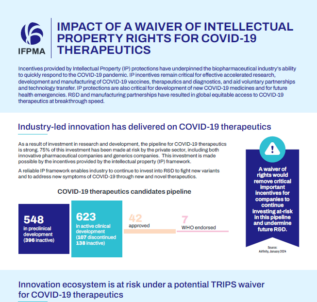Call for special pathogen sharing measures to be included in COP15 Digital Sequence Information negotiations
IFPMA statement on behalf of the pharmaceutical industry at the Convention on Biological Diversity (CBD) COP 15 meeting regarding Digital Sequence Information (DSI).
Statement transcript
IFPMA is grateful for the opportunity to participate in the COP15 negotiations. The importance of biodiversity conservation and sustainable use has become more and more pressing, and IFPMA, the body representing the innovative pharmaceutical industry in official relations with the ECOSOC/United Nations, hopes that a successful negotiation of the Post-2020 Global Biodiversity Framework will allow countries to come together to address biodiversity loss across the globe.
The COVID-19 pandemic has, however, highlighted flaws in the implementation of the Nagoya Protocol that greatly restrict the speed, certainty, and ease at which pathogens can be shared. The negative impact of the implementation of the Nagoya Protocol on public health has been significant and could have even more serious effects. We’ve seen these negative consequences in the sharing of seasonal and pandemic influenza, SARS-CoV-2, Zika, Monkeypox, Japanese Encephalitis, Foot and Mouth Disease, African Swine Fever, and bacterial isolates important for assessing antimicrobial resistance. The way many countries have decided to implement the Nagoya Protocol domestically has led to delays of up to 18 months in the sharing of pathogens, or stopped it altogether.
The COVID-19 pandemic has highlighted flaws in the implementation of the Nagoya Protocol that greatly restrict the speed, certainty, and ease at which pathogens can be shared. Tweet this
Pathogens cannot be treated in the same way as other genetic resources – delays in accessing pathogens in pre-pandemic and pandemic situations can have devastating effects on human lives as well as society at large. Ensuring immediate and unhindered pathogen sharing, through a public health exemption to access and benefit (ABS) rules, is critical for the future of public health.
According to our analysis, an overwhelming majority of Parties to the Nagoya Protocol have not implemented their obligation under Article 8(b) of the Protocol, with only 12 jurisdictions out of 137 having implemented some form of public health exemption. More often than not, this exemption does not provide clarity or speed up the sharing of pathogens. This has weakened legal certainty for R&D despite the willingness and efforts of pharmaceutical companies, research laboratories and the WHO to work with national governments.
The need for improved global pathogen surveillance
Our ability to prepare for and respond to pandemics swiftly rests on improved global pathogen surveillance, immediate information and data sharing, and the scientific community’s ability to collaborate efficiently and effectively. Fast, certain, and unencumbered access to pathogens and their genetic information – known as digital sequence information (DSI) or genetic sequence data (GSD) – is the bedrock of global health security.
Regarding negotiations on digital sequence information (DSI), any policy option or mechanism currently under consideration by member states must include an exemption for pathogens in order to prevent delays in the sharing of pathogens. The current options, as they are formulated, could have serious consequences for the surveillance of pathogens, as they are not specially tailored for the world of public health and thus risk undermining ongoing and future pandemic preparedness and response efforts.
The above points demonstrate that (i) the current ABS system for genetic resources is not working and (ii) that pathogens require special expedited measures. These two issues must be resolved before any new DSI system is implemented. IFPMA is of the firm belief that no ABS system, as proposed, should apply to DSI and that pathogens must be excluded from the scope of the CBD.
About IFPMA
The International Federation of Pharmaceutical Manufacturers and Associations (IFPMA) represents over 90 innovative pharmaceutical companies and associations around the world. Our industry’s almost three million employees discover, develop, and deliver medicines and vaccines that advance global health. Based in Geneva, IFPMA has official relations with the United Nations and contributes industry expertise to help the global health community improve the lives of people everywhere. For more information, visit ifpma.org.
Learn more




